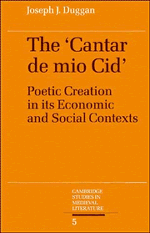Book contents
- Frontmatter
- Dedication
- Contents
- Acknowledgments
- Modern equivalents to names in the maps
- Maps
- 1 Historical and theoretical framework
- 2 The acquisition of wealth
- 3 Economy and gift-giving
- 4 Social status, legitimacy, and inherited worth
- 5 The poet's milieu
- 6 Geography and history
- 7 The Cantar de mio Cid and the French epic tradition
- 8 Mode of composition
- 9 Conclusion
- Notes
- List of references
- Index
8 - Mode of composition
Published online by Cambridge University Press: 05 August 2014
- Frontmatter
- Dedication
- Contents
- Acknowledgments
- Modern equivalents to names in the maps
- Maps
- 1 Historical and theoretical framework
- 2 The acquisition of wealth
- 3 Economy and gift-giving
- 4 Social status, legitimacy, and inherited worth
- 5 The poet's milieu
- 6 Geography and history
- 7 The Cantar de mio Cid and the French epic tradition
- 8 Mode of composition
- 9 Conclusion
- Notes
- List of references
- Index
Summary
Like the issue of the poet's possible debt to chansons de geste, the manner in which he composed the work is a literary question whose resolution holds the potential of shedding light on the social context in which he moved – but positively rather than negatively. As a prelude to discussing mode of composition, I will take up the matter of the tradition in which he was working and, once again but from a different point of view, the date of the Cantar de mio Cid.
The poem's distortions and outright contradictions of history and its unexpected silences about the attributes and achievements of figures who are known to have acted in history, when coupled with its inclusion of themes that have their greatest relevance at the very end of the twelfth century or the beginning of the thirteenth, accord well with a dating of the extant version to shortly before the year 1207 that is mentioned in its colophon. Was the poem created in that period by a poet who made it up virtually ex nihilo? The presence of a series of names of persons who were the Cid's historical contemporaries creates problems for this hypothesis that are insuperable.
That some of these names were borne by people of relative obscurity who are not mentioned in chronicle treatments of the period increases the probability that the poet derived them from an historical tradition of some kind.
- Type
- Chapter
- Information
- The Cantar de mio CidPoetic Creation in its Economic and Social Contexts, pp. 124 - 142Publisher: Cambridge University PressPrint publication year: 1989



